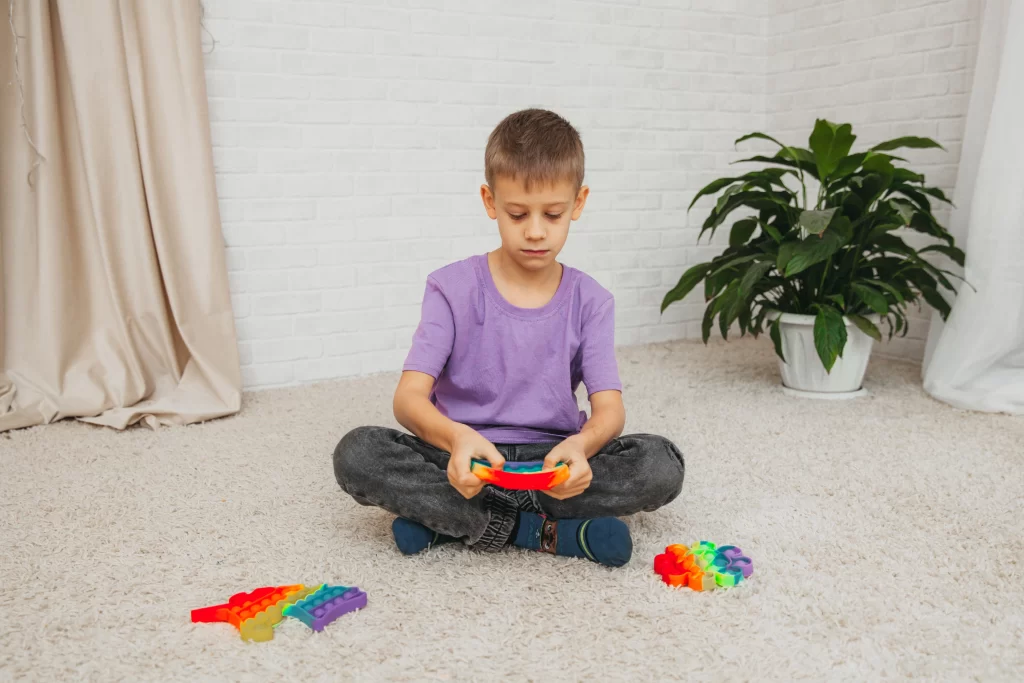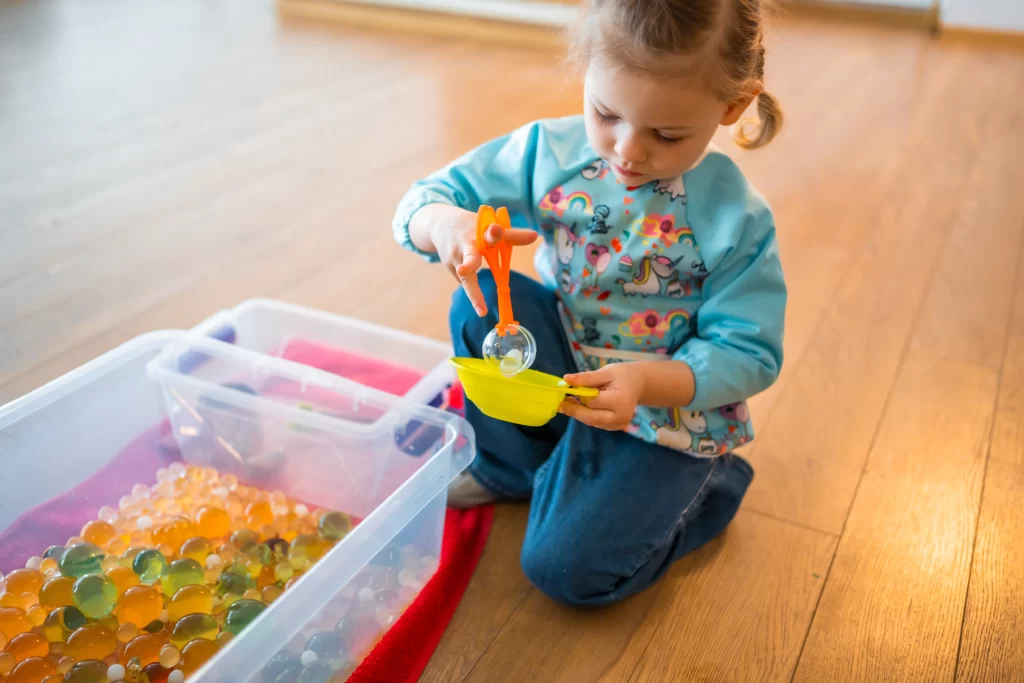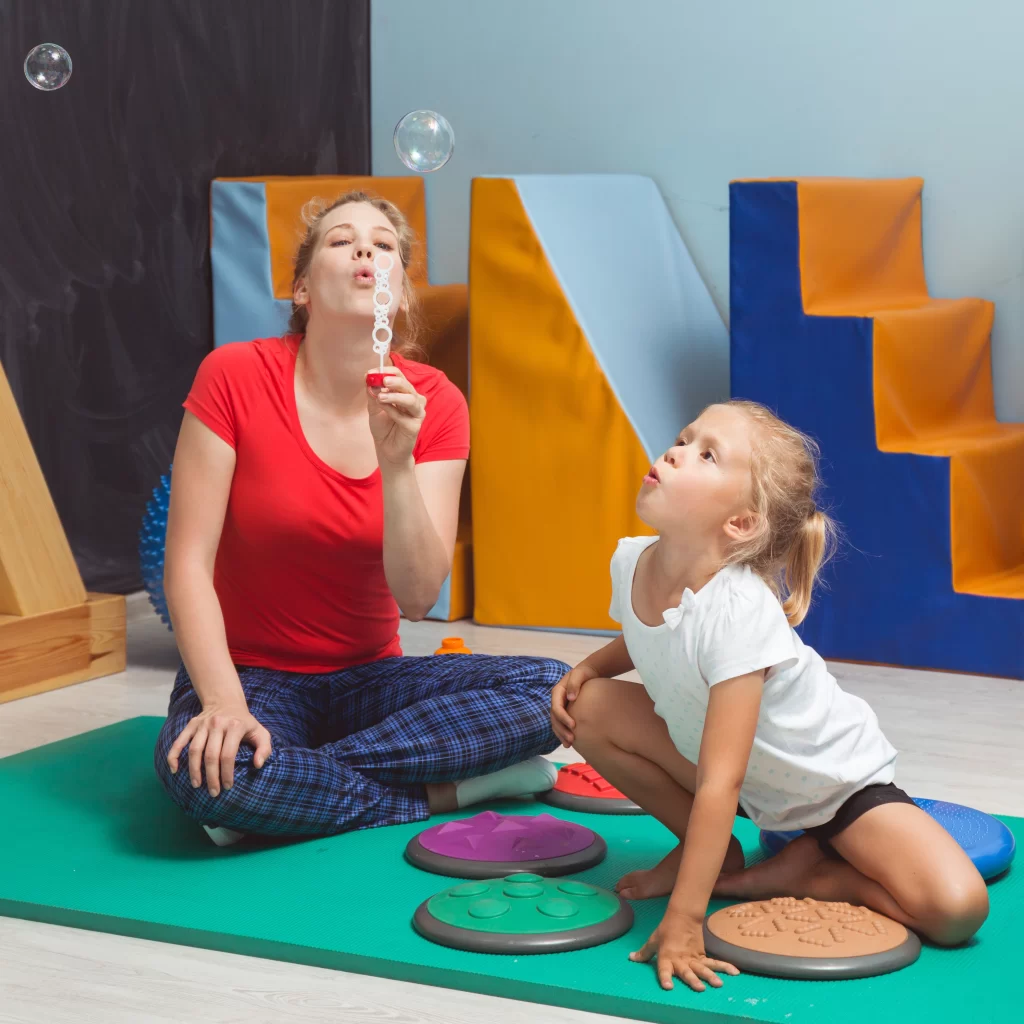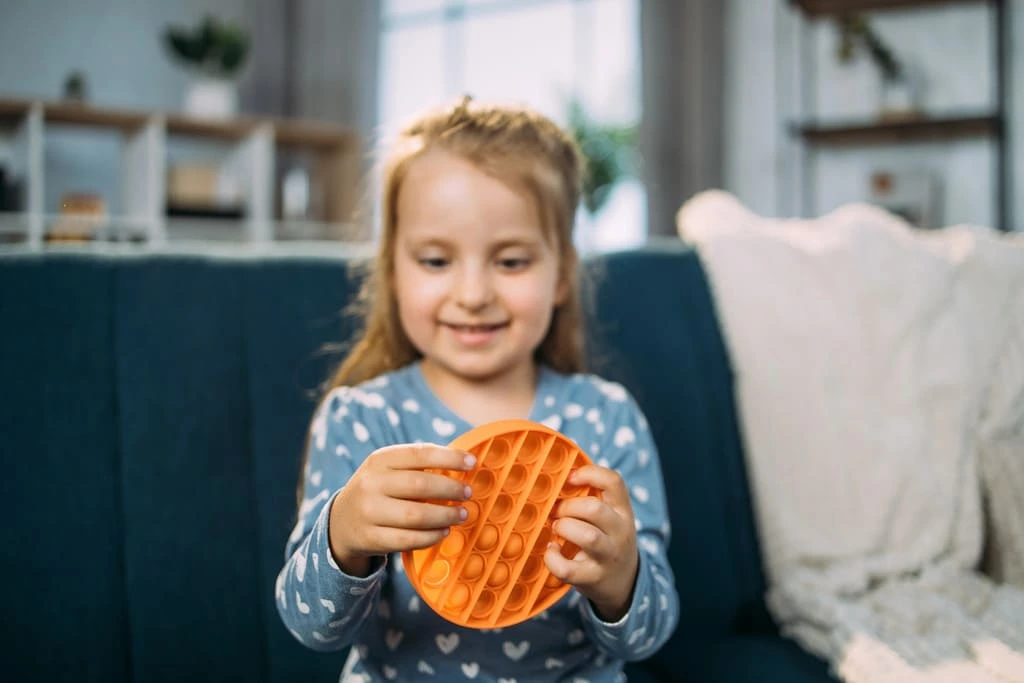What Are Sensory Toys?
Sensory toys are specially designed to stimulate one or more of the senses. In many cases, children on the Autism spectrum might have difficulties with sensory processing. This means that they may find it challenging to process specific sensory stimuli, including:
- Light
- Sight
- Sounds
- Smell
- Textures (in objects, materials, surfaces, and food)
- Touch
Children who experience difficulties with sensory processing may find bright lights, certain sounds, or smells overwhelming. Sensory toys can benefit the cognitive and social development of Autistic children, which is called play-based interventions.
How Do Sensory Toys for Autism Help?
Sensory toys for Autism can help stimulate a child’s senses, sense of balance, and body awareness. These toys are designed specifically for sensory stimulation.
Additionally, these toys can benefit an Autistic child’s sensory needs, which in some cases are unmet in their everyday environment. The individual can access these sensory toys throughout the day, providing a healthy outlet for distress. Sensory toys can also help children on the Autism spectrum develop their gross and fine motor skills and even language skills.

The Importance of Sensory Play
Sensory play is essential for children on the Autism spectrum because it helps them develop communication, socialisation, and self-regulation skills. Sensory play involves engaging in activities that stimulate the senses in a way that’s comfortable for the individual.
Additionally, sensory play can create a safe environment where children can explore and express their feelings, providing a healthy outlet that can reduce behaviours that challenge and improve overall well-being.
Incorporating Sensory Play Into Daily Routines
It’s crucial for caregivers to incorporate sensory play into the daily routines of children that are on the Autism spectrum. However, it’s important to mention that each child is different and has their own boundaries, which need to be respected. Therefore, incorporating sensory play during mealtime, playtime, outdoor time, or any other everyday activity has to happen progressively.
What’s more, caregivers should ensure that children are comfortable with the specific sensory play and that they benefit from it. Otherwise, the sensory play may overwhelm the individual, which may trigger behaviours that challenge.
Sensory Toys and Anxiety
Sensory toys have different textures, colours, and functions – they can be immensely soothing and help reduce anxiety in Autistic children.
This can also lead to a reduction in stress, overwhelming feelings, and behaviours that challenge.
However, each child has a unique sensory preference or need and not all toys will be suitable for a child. Therefore, caregivers should be immensely patient during the process of identifying which sensory toys benefit the child.
How to Choose the Right Sensory Toys?
Choosing the right sensory toys for Autistic children can be a challenging process. It’s crucial to note that the process itself should be individualised. Some children might adapt to the toys faster than others, while some might not prefer them at all.
Hence, it’s essential for caregivers to be observant of what sensory input the child enjoys and requires the most. Additionally, it’s important to incorporate toys that are adequate for the child’s age and developmental level. Some sensory toys might be too challenging, while others might not provide the required sensory input.
Consulting with a professional and getting recommendations for the appropriate sensory toys is advised.
If you’re considering sensory toys for sensory stimulation, you should be aware of some of the most commonly used toys that Autistic children tend to prefer.

Fidget Toys
These sensory toys allow children to focus their energy on one thing. It often provides relaxation and helps children self-regulate. Fidget toys include:
- Fidget spinners
- Stress balls
- Tangles
- Fidget rings
- Pop-its
- Chewable jewellery
Children who use fidget toys show improvement in self-regulation and tend to have increased attention spans during everyday activities.
Infinity Cube
Infinity cubes can be immensely beneficial in enhancing focus, attention, and imaginative play. Additionally, these sensory toys can help develop motor skills in Autistic children.
These toys can be manipulated in multiple ways, providing a calming and relaxing sensory experience.
Jigsaw Puzzles
Jigsaw puzzles can provide various benefits for children that are on the Autism spectrum. Some of the more important ones include the development of problem-solving skills, cognitive development, and enhancement of social skills.
Additionally, children solving jigsaw puzzles might experience a sense of accomplishment after finishing a puzzle which can be incredibly beneficial for children on the Autism spectrum.
Blocks
Blocks can be made from different materials and come in different shapes and sizes. These toys can be immensely beneficial for stimulating the sensory needs of children on the Autism spectrum.
Additionally, blocks and similar sensory toys can help children enhance their motor skills, develop cognitive skills, and enhance their creativity.
Key Benefits of Sensory Toys for Children with Autism
Sensory toys can provide many different benefits for children with Autism Spectrum Disorder. Some of the key benefits include:
1. Sensory stimulation: these toys can help children on the Autism spectrum regulate their sensory processing.
2. Development of motor skills: blocks, fidget toys, and puzzles can help Autistic children develop their motor skills, including holding, grasping, and manipulating.
3. Enhance social skills: many sensory toys can be used in social situations, making it easier for Autistic children to interact with other individuals. This can help develop skills such as communication and cooperation.
4. Reduced behaviours that challenge: in some cases, behaviours that challenge can be triggered by situations that are stressful or generally uncomfortable for children on the Autism spectrum. Sensory toys provide a calming experience that can eliminate uncomfortable feelings, thus reducing behaviours that challenge.
How a Person-Centred Approach Can Contribute to More Fun and Skills for Autistic Children
Children on the Autism spectrum can benefit immensely from a person-centred approach.
A person-centred approach provides compassionate support that focuses on the child’s unique needs, wants, and preferences. This way, the child can be involved as much as possible in the support planning, which ensures the utmost comfort and an environment where the child can thrive.
Additionally, the person-centred approach focuses on the child’s strengths and skills, which later on are enhanced with the help and support of a care team.

Unique Community Services Is Dedicated to Supporting Autistic Children to Live Fulfilling Lives
At Unique Community Services, we offer tailored care for individuals on the Autism spectrum who require complex care. Our clinicians share one objective – to create an environment where Autistic children can feel safe, thrive, and reach their full potential. Additionally, our clinicians are trained and equipped to identify the strengths of each child and leverage their unique set of skills.
At Unique Community Services, we embrace diversity and equality, and our goal is to promote freedom of choice and equal opportunities for everyone. If you or your loved one needs support, contact us or our offices in Leeds and Manchester directly for further information
